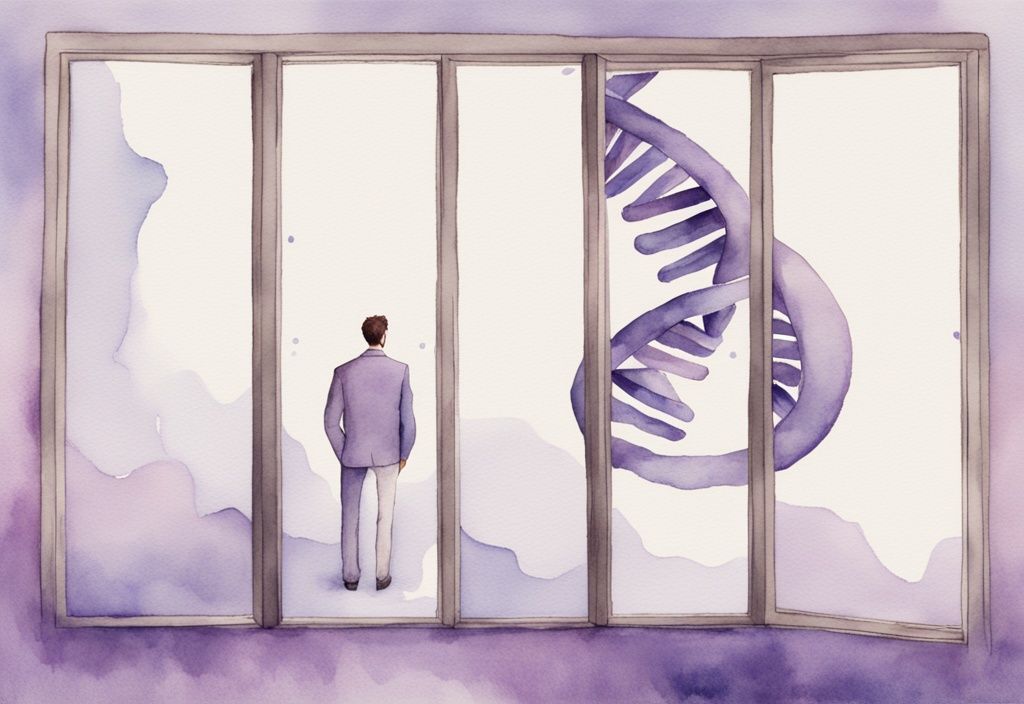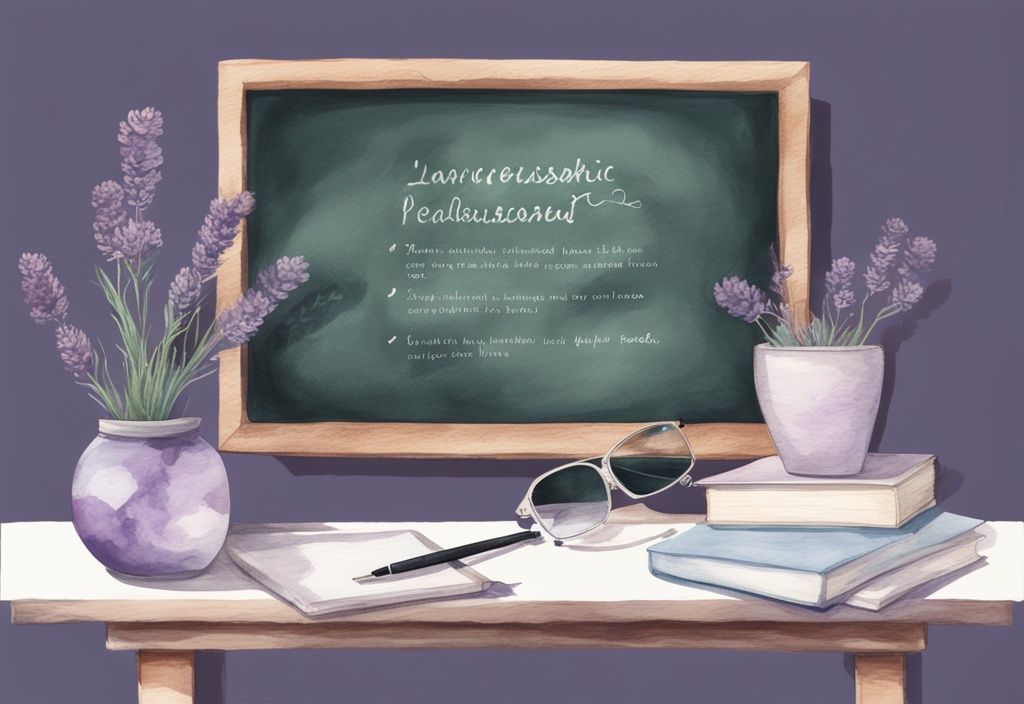Understanding Love: Are Narcissists Capable of Love? Unpacking the Reality
Ever wondered, “Are narcissists truly capable of love?” We’re about to embark on a deep exploration into the complexities of Narcissistic Personality Disorder (NPD) and its effects on relationships.
In this insightful read, we’ll uncover the mysterious facets of a narcissist’s ability, or lack thereof, to genuinely love. You’ll gain a deeper understanding of why their displays of affection often seem conditional and transactional.
Through this journey of knowledge, you’ll be equipped to better navigate the challenging dynamics of loving someone with NPD, and to protect not just your well-being, but also foster healthier connections moving forward.
Understanding Narcissistic Personality Disorder (NPD)
Narcissistic Personality Disorder (NPD) is characterized by a chronic pattern of grandiosity, a desperate need for constant admiration, and a profound lack of empathy, as highlighted in a study that finds NPD may have a biological component, which you can read more about here. These traits severely impact one’s ability to forge genuine, loving relationships, often leading to significant emotional distress both for themselves and those around them.
Definition and Diagnostic Criteria
NPD is more than just an inflated ego. It involves a deep-seated belief in one’s superiority, often without merits to back it up. Here are some diagnostic criteria used by mental health professionals:
- Grandiose Sense of Self-Importance: This involves an overblown view of one’s abilities and achievements, often without real merit.
- Fantasies of Unlimited Success or Power: Individuals with NPD frequently indulge in one-sided fantasies of incomparable success, power, brilliance, and ideal love.
- Belief in Being Special and Unique: They perceive themselves as unique or superior and feel they should only associate with similarly high-status people or institutions.
- Requiring Excessive Admiration: Consistently seeking excessive praises and admiration from others to bolster their self-esteem.
- Sense of Entitlement: An unwarranted expectation of especially favorable treatment or compliance with their wishes.
- Exploitative Behaviors in Relationships: They tend to take advantage of others to achieve their own ends, often failing to reciprocate any form of emotional investment.
- Lack of Empathy: A significant inability or unwillingness to recognize or identify with the feelings and needs of others.
- Envy: They often harbor envy toward others and believe others are envious of them.
- Arrogance: Behaving in an arrogant or haughty manner, often in casual or social situations.
Only licensed mental health professionals can diagnose NPD, using these criteria to conduct thorough evaluations and interviews.
Prevalence of NPD in the Population
NPD affects a notable portion of adults. In the U.S. alone, prevalence rates vary between 0.5% and 5%. Several factors influence these rates, including geography, demographics, and cultural backgrounds. Typically, men are diagnosed with NPD more frequently than women.
Understanding these statistics aids in raising awareness and guiding public health strategies. Cultural norms, societal expectations, and population density also shape how NPD is perceived and manifests in different communities, leading to diverse prevalence rates worldwide.
Are Narcissists Capable of Love?
One of the most heart-wrenching questions is whether narcissists are capable of love. Due to their inherent lack of empathy, genuine selfless love can often be challenging for those with NPD. Their relationships are frequently transactional, centered around what they can gain rather than offering mutual support and affection.

A narcissist may express love as a means to an end, utilizing affection to ensure admiration or compliance. However, this does not mean they are entirely incapable of feeling love. It’s essential to understand that the love experienced by a narcissist is often conditional and self-serving, making it difficult for true emotional intimacy to flourish.
Despite these challenges, some individuals with NPD may develop a semblance of love over time, especially with therapeutic intervention. Therapy can help them learn empathy and develop healthier relationship patterns, though this journey is often lengthy and fraught with difficulties.
For those in relationships with narcissists, it’s vital to seek support and establish boundaries to protect one’s emotional well-being. Understanding the complexities of NPD can foster compassion while also encouraging practical strategies for coping and healing.
Key Traits of Narcissistic Personality Disorder
Lack of Empathy and Its Impact on Love
Narcissists struggle to understand or feel compassion for others’ emotions. This deficit in emotional connectivity impedes their ability to deeply connect with their partners. Imagine trying to build a bridge with missing pieces—you can’t create real connection without empathy.
Empathy is crucial for deep emotional connections and mutual love. Without it, relationships lack the genuine bonds and nurturing needed to thrive. This absence of empathy essentially creates a void where real intimacy should be, leaving partners feeling isolated and unheard.
This inability to empathize undermines the formation of genuine emotional bonds and nurturing relationships, leading to shallow and often transactional connections. Imagine the emotional landscape of a relationship as a garden; without empathy, it’s as if the garden is starved of water, unable to flourish.
Sense of Entitlement and Self-importance
Individuals with Narcissistic Personality Disorder (NPD) may feel they deserve special treatment or rewards regardless of merit. This inflated self-view often results in unrealistic expectations from those around them. The demands of this sense of entitlement can feel like an unending uphill battle for their partners.
This sense of entitlement often leads to exploitative behaviors in relationships, focusing on their own needs over their partner’s. As a result, partners may feel undervalued and ignored. It’s like being on a seesaw that’s perpetually unbalanced.
Such self-importance hinders mutual respect and equality essential for healthy relationships. This obstacle prevents the development of balanced and respectful partnerships, leaving a trail of disappointment and resentment. Think of it as trying to dance in perfect harmony, but one partner always insists on leading.
Exploitation and Manipulative Behaviors
Narcissists often exploit others to achieve personal gain or fulfill their needs. This tendency turns relationships into a means to an end, devoid of genuine affection. A relationship should be a partnership, not a transaction.
Common manipulative tactics include gaslighting, emotional manipulation, and love bombing. These tactics are designed to control and dominate their partners, resulting in toxic dynamics. It’s as though the emotional environment becomes a minefield, where every step feels precarious.
These behaviors contribute to toxic and unbalanced relationship dynamics, making it difficult for partners to achieve a healthy and supportive connection. It’s like trying to row a boat when one person keeps drilling holes—no matter how hard you try, it’s nearly impossible to stay afloat.
Can Narcissists Experience Love?
Difference Between Narcissistic Traits and NPD
Not everyone who exhibits narcissistic behaviors has Narcissistic Personality Disorder (NPD). Narcissistic traits exist on a spectrum, ranging from mild characteristics to the full-blown disorder. Individuals with just traits, rather than a diagnosis, may still be capable of experiencing love in a more traditional sense.
The influence of these traits on a person’s ability to love can vary significantly. Context, life circumstances, and individual backgrounds play crucial roles. For example, someone might display narcissistic traits in highly stressful situations but otherwise maintain healthy, loving relationships.
Narcissistic Affection vs Genuine Love
While narcissists can demonstrate affection and form attachments, their emotions often stem from self-interest. Their affection mainly focuses on admiration and validation from their partners, serving their need for constant reinforcement of self-worth. This self-serving nature of their attachments raises a critical question: are narcissists capable of love in its truest sense?

Genuine love entails reciprocity and mutual vulnerability—elements that are challenging for narcissists. True love requires emotional give-and-take, concern, and respect for the other person, aspects narcissists often struggle to achieve. Authentic emotional investment is difficult for them, complicating the formation of healthy, balanced relationships.
Conditional Love and Transactional Dynamics
Narcissistic love is frequently conditional, hinging on the partner’s capacity to boost the narcissist’s self-esteem. These relationships can feel transactional, focusing on what each person can gain rather than mutual affection and shared experiences.
This conditional nature and self-centered focus impede the authenticity of their love. As a result, partners often feel that their value in the relationship is based on their ability to satisfy the narcissist’s needs. This dynamic leads to an imbalance that can erode genuine affection over time.
The transactional dynamics reinforce the idea that narcissists are more suited to forming superficial connections rather than deeply-rooted, selfless love. Understanding these dynamics can help individuals navigate relationships with narcissists more effectively.
Challenges in Relationships with Narcissists
Emotional Manipulation and Gaslighting
Emotional manipulation is a signature move in the complex dance of dealing with a narcissist. Gaslighting, one of their favorite tactics, can slowly but surely unravel your sense of reality. Over time, you might find yourself questioning your own thoughts and feelings. The constant blame-shifting, guilt-tripping, and reality distortion serve to erode your confidence and self-worth, making it harder to trust your own judgment. You might end up feeling confused, invalidated, and increasingly reliant on the narcissist’s version of events.
Love Bombing and Its Consequences
Love bombing is where the narcissist’s seemingly endless charm and affection sweep you off your feet, wrapping you in a dizzying whirl of attention and praise. It’s intoxicating and creates an emotional dependency that binds you closer. But, beware, this isn’t about love—it’s about control. As soon as the narcissist feels secure in their grip on you, the intense affection is replaced by cold neglect. This cruel bait-and-switch leaves you constantly chasing the high of early admiration, an emotional chase that can be deeply destabilizing.
Setting and Maintaining Healthy Boundaries
In the bewildering world of a relationship with a narcissist, setting and maintaining boundaries becomes your lifeline. These boundaries are your defense against their manipulative ways. Clear communication and assertiveness are not just important; they’re crucial. By continually drawing lines about what you will and will not accept, you reclaim power over your emotional well-being. Establishing these boundaries helps you preserve your mental health, a key step in fostering resilience and self-respect amidst the chaos.
Therapy and Professional Help
Understanding and managing relationships with narcissists can be incredibly challenging. To foster healthier interactions and protect one’s well-being, it’s essential to recognize unhealthy patterns, consider professional help, and prioritize self-care. Let’s dive into these areas, from identifying toxic behaviors to leveraging therapy and educational resources.
Recognizing Unhealthy Patterns
- Awareness of detrimental behaviors is the first critical step toward improvement. Noticing a partner’s toxic actions—such as manipulation, lack of empathy, and a constant need for validation—lays the groundwork for change.
- Therapy can illuminate and break down unhealthy patterns in relationships. Therapists trained in narcissism provide a supportive space to explore these intricate dynamics.
- Utilizing educational resources about Narcissistic Personality Disorder (NPD) aids in recognition. Books, support groups, and online content offer valuable insights into understanding how these behaviors manifest and their impact on relationships.
The Role of Therapy in Navigating Relationships
- Therapy offers tools and strategies to manage interactions with narcissists. Key techniques include setting boundaries, honing communication skills, and developing emotional detachment.
- Through therapy, individuals can enhance communication skills and build emotional resilience. Learning to express needs clearly and maintaining emotional strength is crucial when managing the stress induced by narcissistic behaviors.
- While couples therapy can sometimes help, its effectiveness hinges on the narcissist’s willingness to change. Their cooperation is vital for any meaningful progress in improving relationship dynamics.
Importance of Self-Care and Education
- Self-care practices are integral for mental and emotional well-being. Activities like meditation, exercise, or engaging hobbies can help individuals stay grounded and manage the stress of challenging relationships.
- Educating oneself about NPD is a protective measure against manipulative behaviors. Being informed about narcissistic traits and tactics empowers individuals to respond appropriately and set necessary boundaries.
- Support from friends, family, or support groups is invaluable. A supportive network offers emotional backing and practical advice, ensuring individuals don’t feel isolated while navigating the challenges presented by a narcissistic partner.

Signs and Symptoms of Narcissistic Behavior
Narcissistic behavior manifests in various ways, often leaving their relationships on fragile ground. Below are key indicators that someone may have narcissistic tendencies, heavily impacting their ability to truly love.
Lack of Empathy and Constant Need for Attention
- Difficulty in recognizing or caring about others’ emotions: Imagine trying to connect with someone who can’t tune into your feelings. Narcissists struggle to understand or value other people’s emotions, leading to relationships that feel shallow and unfulfilling. Their self-absorbed focus shuts out the perspectives and needs of their partners, making any form of deep love challenging.
- Excessive need for admiration: Picture a constant performer on a stage, craving applause. Narcissists thrive on validation and praise. They dominate conversations to maintain the spotlight, leaving little room for genuine, two-way interactions. This relentless quest for admiration props up their inflated self-image but blocks the pathway to selfless, deep love.
- Impact on emotional connections: The lack of empathy severely undercuts any potential for real emotional intimacy. Without understanding and respecting their partner’s feelings, narcissists find it nearly impossible to build nurturing, loving bonds. Interactions remain on the surface, devoid of the emotional depth and mutual respect that true love demands.
Manipulative Tendencies
- Exploiting others to meet their own needs: Narcissists often use manipulation to get what they want, even at the expense of their partners. They exploit kindness and resources to bolster their own needs, disrupting any chance for a balanced relationship based on mutual care and respect.
- Tactics including lying, flattery, and deceit: To maintain control and a superior self-image, narcissists frequently resort to deceit. Lying, excessive flattery, and orchestrating situations to their advantage erode their partner’s trust and self-worth. Such manipulative behaviors make genuine love and trust nearly impossible to cultivate.
- Using others as tools for self-enhancement: Rather than seeing their partner as an equal, narcissists often view them as tools for enhancing their own self-image. Techniques like gaslighting and love bombing keep their partner off balance and question their reality, thwarting the formation of a healthy, loving relationship.
Conclusion
- Are Narcissists Capable of Love? Narcissists can indeed display affection, yet their capacity for experiencing genuine, selfless love is inherently limited. This limitation arises from their deep-seated need for admiration and a significant lack of empathy, which obstructs authentic emotional connections.
- Conditional Love and Transactional Dynamics: Relationships with narcissists frequently revolve around conditional love. Their affection typically depends on their partner’s ability to affirm their self-esteem. This transactional nature transforms the relationship into a continuous exchange rather than a true, heartfelt bond.
- Understanding NPD’s Impact on Love: Comprehending how Narcissistic Personality Disorder (NPD) impacts love is essential for anyone involved with a narcissist. Awareness of the disorder’s effects aids in navigating the intricate emotional landscape, fostering realistic expectations and effective coping strategies.
In conclusion, while narcissists can manifest forms of affection, the core traits of NPD, such as the lack of empathy and an all-consuming sense of self-importance, markedly constrain their ability to experience true, selfless love. Relationships with narcissists are often marked by conditional love and a focus on personal gain. Understanding the profound impact of NPD on love is crucial for anyone entangled in such relationships, as it equips you to tackle the unique challenges these dynamics present.
FAQ
Can Narcissists Feel Genuine Love?
• Narcissists can feel affection, but genuine love—which involves empathy and selflessness—is often beyond their capacity. Their love is largely conditional and self-serving. They may perceive love differently, focusing on how their partners reflect on them. For them, love is more about validation and less about emotional depth.
How Do Narcissists Manipulate Their Partners?
• Common tactics include gaslighting, love bombing, and emotional manipulation. Narcissists utilize guilt, blame-shifting, and constant criticism to control their partners. These behaviors serve to maintain their sense of superiority. This manipulation often leaves their partners feeling unworthy and confused, trapped in a cycle that’s hard to break.
What Should I Do If I Am in a Relationship with a Narcissist?
• Seek professional help to understand the dynamics and develop coping strategies. Establish and maintain strong personal boundaries to protect yourself. It’s essential to prioritize self-care and build a support network for emotional support. Remember, your well-being comes first, and understanding your worth is crucial in navigating this complex relationship.
Is Therapy Effective for Narcissists?
• Therapy can help some narcissists develop healthier relationship patterns and empathy. Success varies and depends on the individual’s willingness to change. Therapy is often more effective for those with narcissistic traits rather than full-blown Narcissistic Personality Disorder (NPD).
Can Setting Boundaries Help in Dealing with a Narcissist?
• Yes, setting firm boundaries can limit manipulative behaviors and protect your well-being. Clear, consistent communication about what you consider acceptable behavior is crucial. Boundaries help maintain emotional autonomy and reduce the risks of exploitation, empowering you to manage the relationship more effectively.














Post Comment